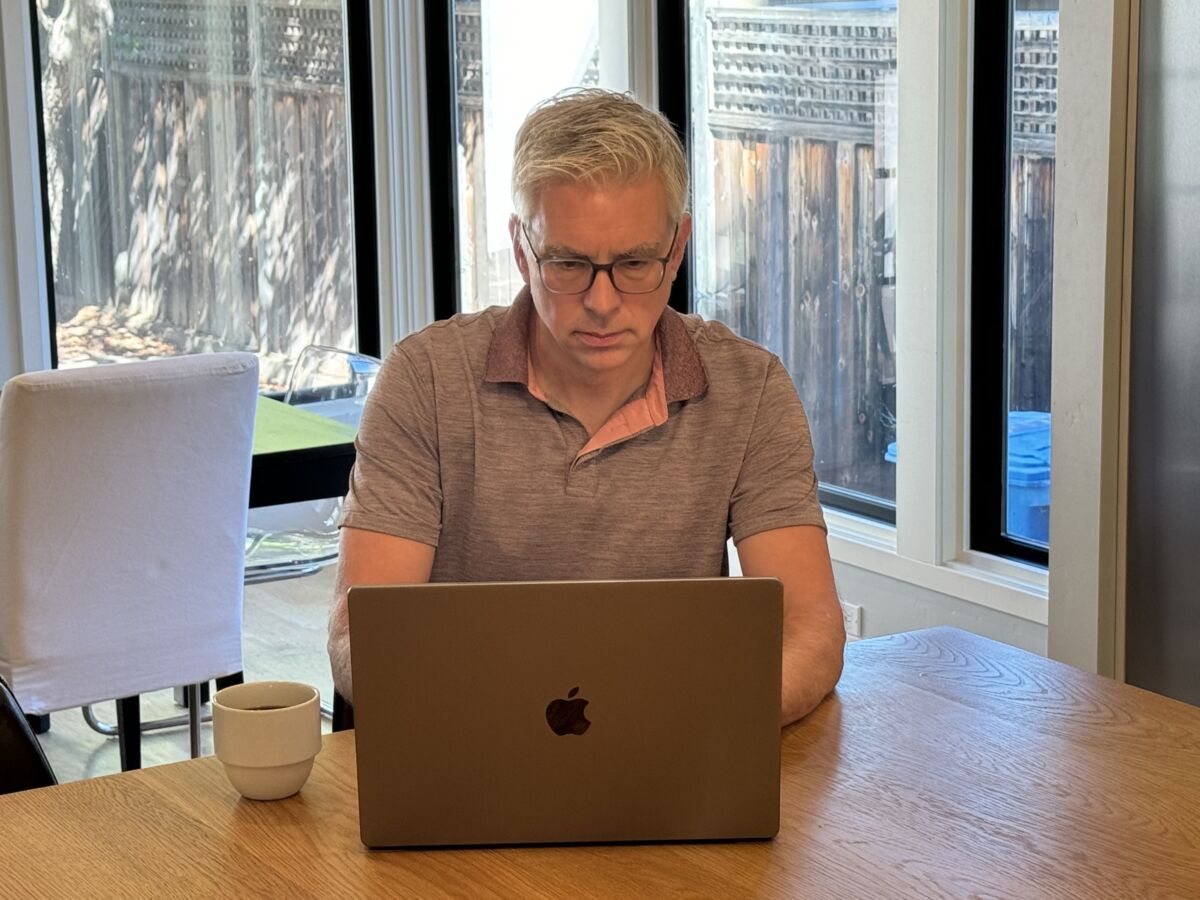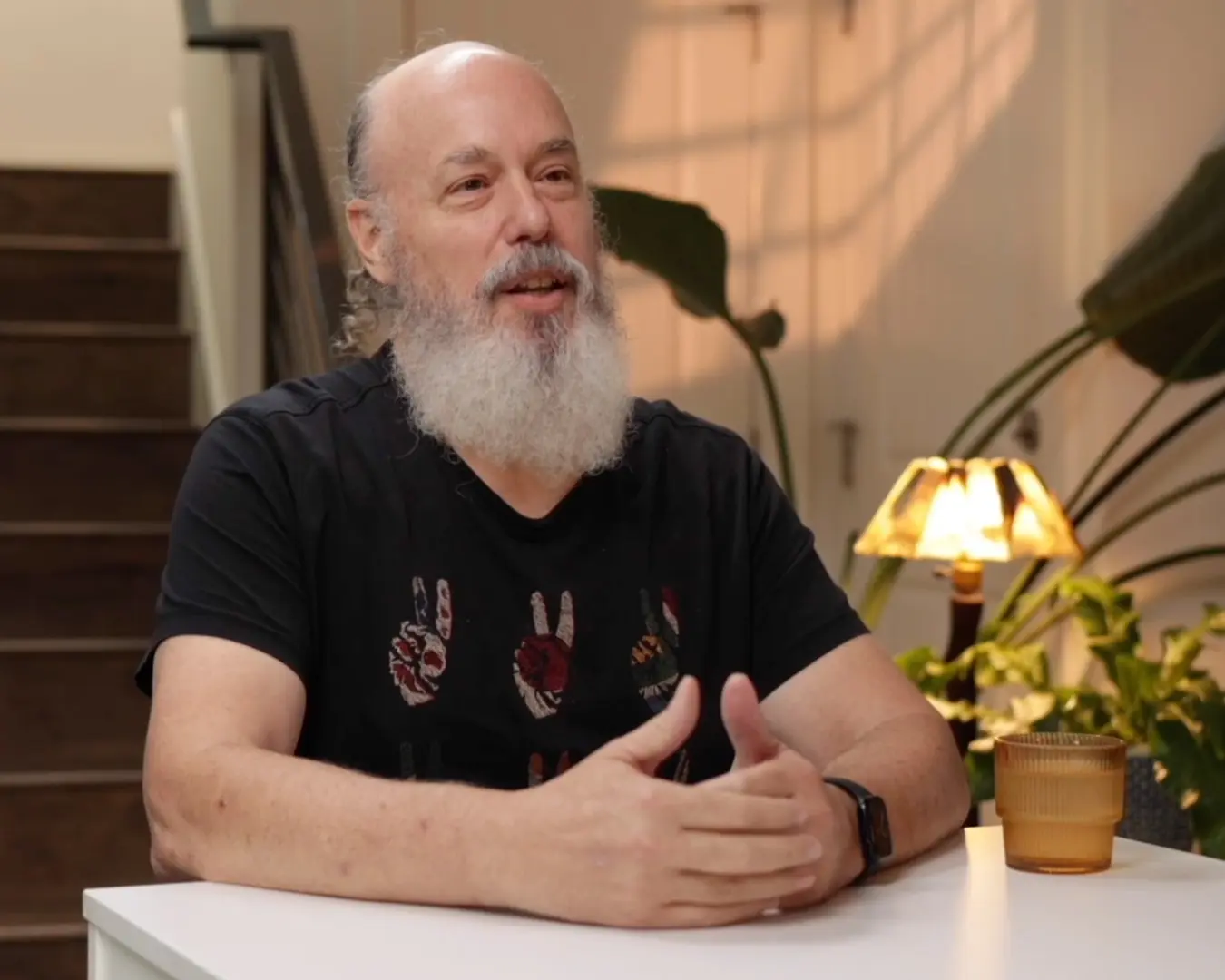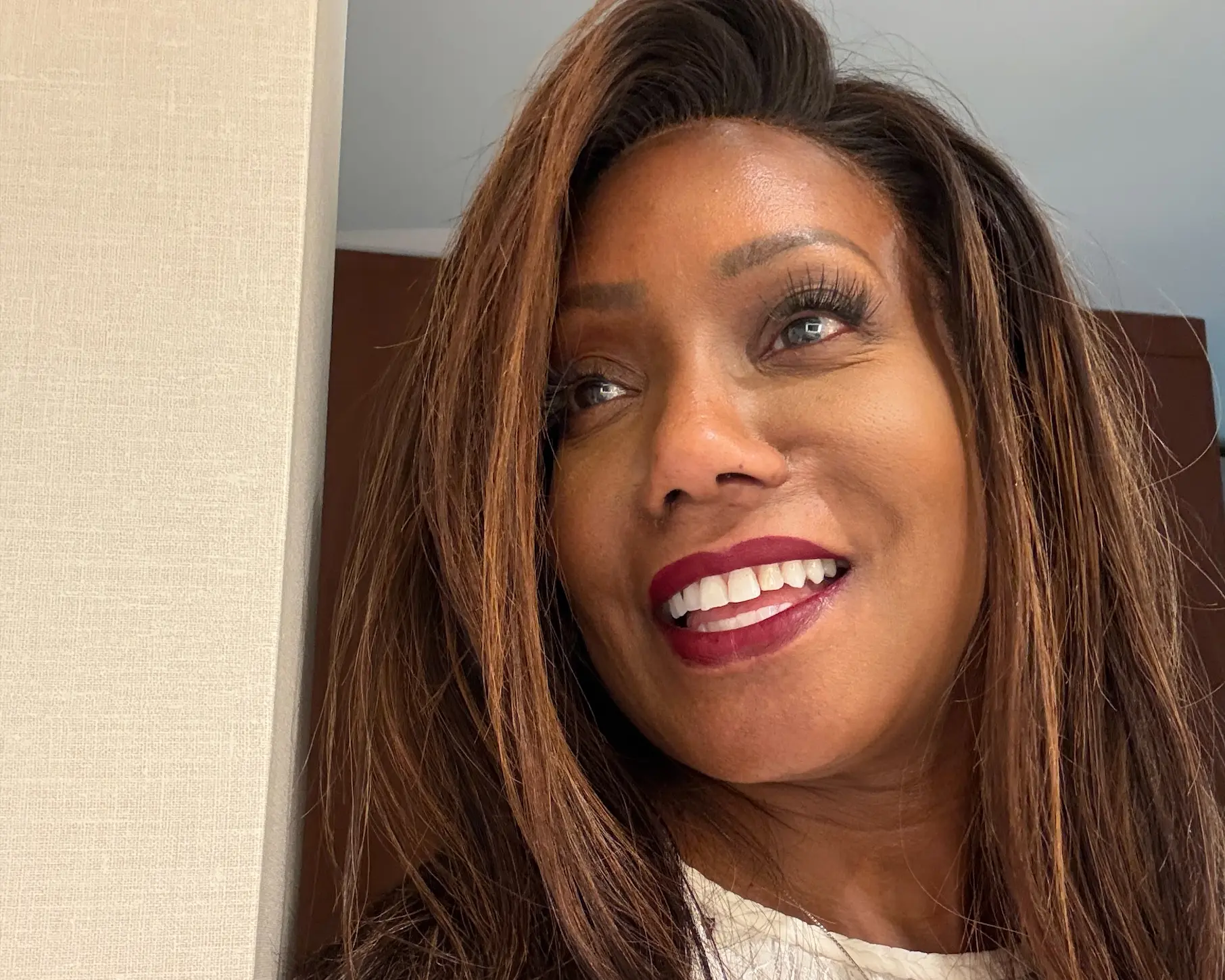
The reality of middle age
Optimism has always been my defining trait—sometimes to a fault. My wife often jokes about my “toxic positivity,” and honestly, she’s not wrong. In a past life, I was probably one of the musicians on the Titanic, cheerfully encouraging the band to keep playing as the ship went down. “No worries, lads! There’s still time for ‘Nearer, My God to Thee’!”
These days, I’m working on balancing my optimism with the realities of life in middle age. That’s why RestlessUrban resonates so deeply with me. It’s not just about surviving midlife—it’s about thriving and reinventing ourselves. “Life Begins at 50” has never felt more true, especially after my “toxic positivity” took a hit this summer when I went through a tough professional experience—being laid off as part of a mass corporate restructuring.
Forty percent of Americans have experienced it
It’s a situation 40% of American workers have been through at least once, according to career transition services firm Intoo. The mysterious Zoom invite arriving on a Thursday morning (because apparently losing your job before the weekend is less traumatizing). The scripted speech from your boss about severance, vacation pay, insurance, and outplacement. And the offer to answer questions, but you don’t ask any—because you’re in shock.

Corporate layoffs are a sad and unfortunate reality.
Sweeping company layoffs originated with GE CEO “Neutron” Jack Welch in the mid-80s, popularized as a cost-cutting tool—like a neutron bomb that wipes out people but leaves buildings standing. The goal? Boost profitability and keep physical resources intact. That thinking remains in today’s corporate America, where anyone can be let go at any time, for any reason. It’s the game we play as professionals. I’m happy to play it. Hell, I’m grateful to play it.
But I can’t deny that we RestlessUrbanites face a unique vulnerability. Our longer career experiences and higher salaries often make us more expensive for employers compared to younger, more budget-friendly Millennials. There’s also the concern about how long we’ll stay, perceived adaptability, and an implicit bias that favors “up-and-coming” talent over seasoned professionals. Dare I say maybe, just maybe, Generation X is starting to feel the sting of ageism? A recent AARP study found that a whopping 41% of workers over 40 said they experienced age discrimination in recent years.
A sobering moment
Losing my job was a sobering moment. But it also one that pushed me to rethink, reframe, and look forward. I dived into my network of colleagues and friends, lifting my spirits by talking with fellow displaced Gen-Xers, children of the era when MTV actually played music videos and the internet screeched to life through dial-up connections. All of my peers in this situation are puzzled as to why, in a time of low unemployment and falling interest rates, landing a great job aligned with our expertise and interests feels so elusive.
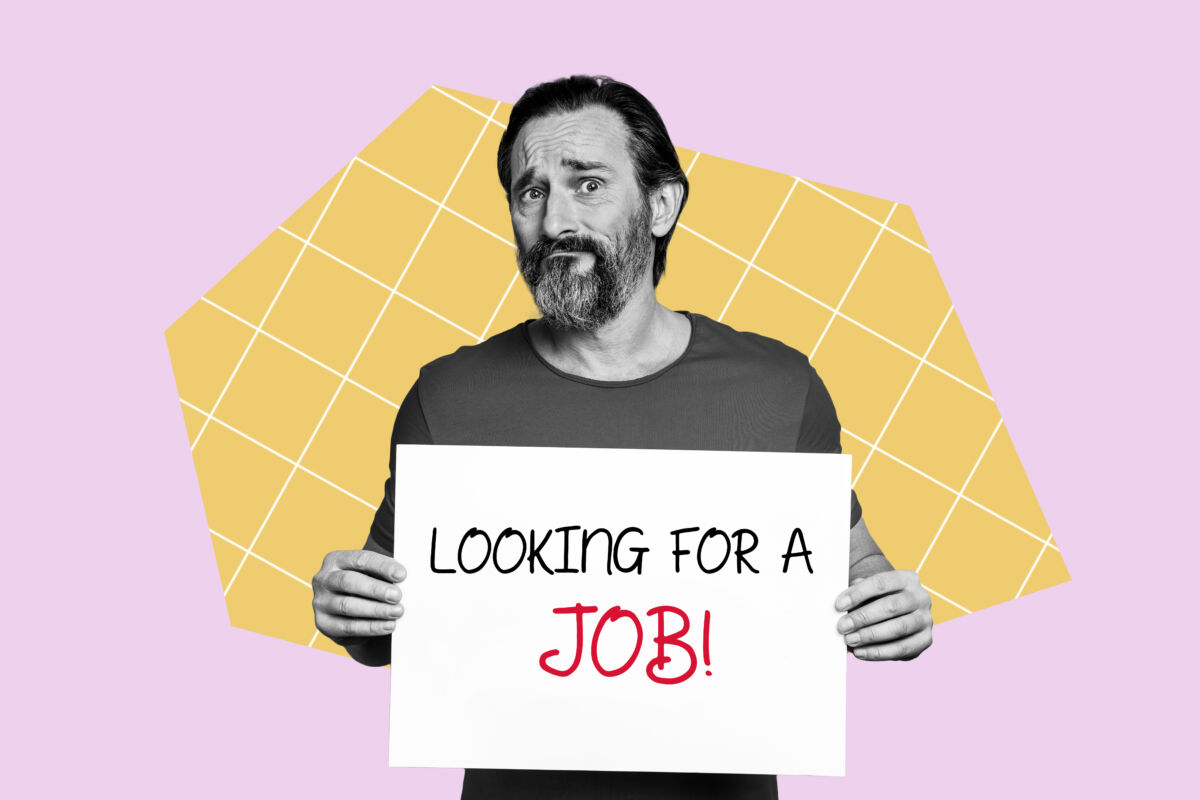
Composite trend artwork image photo collage of middle age man looking for a job banner work employment human resources vacancy candidate.
We bring decades of experience, starting as interns fetching coffee in the 90s, drinking the Kool-Aid as middle managers in the early aughts, and then mixing it as leaders in recent years. We led teams, made tough hiring and firing decisions, delivered keynotes at conferences, motivated others when morale was low, and tackled the challenges our companies threw at us. We’ve seen and done it all on this crazy professional roller coaster. So why, after all that, do we still struggle with “imposter syndrome?”
My former colleague “Lisa” was recently laid off from a startup, despite having run marketing for multiple high-growth startups in recent years. She’s racked up impressive accolades along the way, including a Webby Award (the tech world’s version of an Oscar), and honors from Forbes, Fast Company, and TIME. Before diving into the startup scene, she led mobile and multichannel digital marketing for one of the world’s largest companies, including the pilot-launch of a new eCommerce service.
At the crossroads
Yet now, it feels like all those achievements seem to be not enough, like they are just capstones instead of milestones on a successful career. “I feel like I’m at a crossroads,” Lisa reveals over lunch at a cozy Chinese restaurant in San Francisco’s Noe Valley. “I’m in midlife, I have all this experience, and I’m not ready to retire. But I’m starting to wonder if companies are ready to keep people my age employed.”
Another former colleague, “Jen,” spent her entire 24-year career at a massive retail company, rising to the VP level, only to be laid off unexpectedly this summer. While the layoff came as a shock, Jen focuses on her gratitude—for a generous severance package and the wealth of experiences her long career provided. She worked her way up the global organization to take roles in tech, product management, business strategy, supply chain, logistics, international, and other functions. But more than just mastering the business, she honed emotional intelligence, soft skills, and the nuances of professional etiquette.
“I remember my first corporate job as a buyer. I was told I had to attend a business dinner,” she recalls. “I panicked because I had no idea about the protocols—how to order, how to hold a wine glass.”
An older colleague stepped in, giving her a quick crash course in business-dinner etiquette. That small act of kindness stuck with her and is a reason she helps others, mentoring and supporting recently laid-off contacts, sharing encouragement and referring potential job opportunities.

Cultivating mentorships has become more challenging in the current hybrid work environment.
Jen acknowledges the mentorship she experienced is harder to come by in today’s hybrid work environment, where virtual meetings often replace in-person interactions. Spontaneous, meaningful conversations just don’t happen as much when you’re talking through computer screens. Maybe they need to.
Old dogs and bold tricks
“Robin” is a seasoned Silicon Valley recruiter with over two decades of experience (also a colleague of mine at two employers.) She knows the talent business in-and-out, and doesn’t mince words when it comes to addressing potential bias against middle-aged job seekers.
“Does [the industry] value anyone with 20 plus years experience?” she asks rhetorically over the phone.
“Do they think this person would be overqualified for the job, would they be bored with the job?”

One recruiter says keep your resume concise and focused on recent, relevant roles.
This bias is compounded by the perception that older workers may struggle to pivot or adapt to fast-paced, innovative environments—despite a wealth of knowledge. Moreover, the rise of social media has fueled the narrative that younger candidates are more agile and innovative, while older professionals are seen as “set in their ways.”
Despite these realities for job seekers, Robin says midlifers can differentiate themselves by tailoring their resumes and LinkedIn profiles according to the specific roles they are going for. (This has never been easier thanks to ChatGPT.) Robin emphasizes the importance of authenticity, networking, and presenting experiences in ways that resonate with today’s company cultures and values.
She says it’s important to share those compelling stories that highlight scrappiness, grit, and adaptability. But don’t go too far in the past, especially if you are interviewing for a company that has been around for less time that you have been a working professional. Experiences on your resume that are older than 10 years could make you appear “too old” to potential employers, a disheartening reality for Gen X job seekers.
A call to the Pope extends a career
Back in 2010, John Pope found himself in his early sixties, recently laid off from a role running PR for an online manufacturing marketplace. “I was sitting on my ranch with my feet up, drinking a Natty Lite at 62 years old, wondering, ‘Can I retire? I guess I could…’”
But, as Allen Saunders famously said (and John Lennon sang), “life is what happens to us while we are making other plans.” John’s life took a turn when he received a call from RestlessUrban founder Andrew Bowins, who at the time was Director of Communications for a European-based telecommunications company. That call led to six more years of work, with stints in New York, Finland, and Germany. Pope’s contributions were so valuable that even his wife, also a talented communications professional, was hired by the company.

John and Deborah Pope.
Pope reflects fondly on this unexpected “encore” of his career. There were definitely tough times—like when marketshare was nosediving for his employer and he had to present a mountain of negative press coverage to a newly appointed CEO. But his positive outlook carried him through those challenges and shaped his role as a mentor.
I can speak to this firsthand, as I was part of that PR team grappling with the declining company performance, negative press coverage and almost-universal customer backlash. John and Andrew had pioneered social media engagement at another tech company and guided the team on the best practices and pitfalls of online engagement. I am grateful for what I learned in that tumultuous time. I still apply those lessons today.
Pope says he never felt the sting of ageism, even working well into his late 60s. His last manager even begged him to stay just a bit longer so he could qualify for the company bonus—an offer he respectfully declined. Maybe it was a different time, or maybe European work cultures simply have more respect for age and experience. Perhaps Pope’s story is less likely to happen in 2025, but it’s a reminder of the lasting power of mentorship and the value of sharing wisdom across generations.
As he reflects, “I had a long career, and if I look back, I was very lucky to manage talented people. But the most important thing in my career was the network that was created… with me in it. The network really made things happen for me.”
Wise words from a seasoned professional. I’m equally grateful for my own network, and I hope it plays a similar role in my journey. My network is what gets me out of bed every day, sending me job leads, checking in with words of encouragement, offering a wealth of advice—sometimes even conflicting advice.
Do I seem desperate?
Should I keep the “Open to Work” banner on LinkedIn, or does it make me seem desperate?
Is it worth it to blindly apply to a position without knowing anyone at the company, or is it a waste of time?
Is sending a LinkedIn request to someone you don’t know bold, or rude?
I’ll grapple with these questions in the coming weeks, and I’ll share my journey here on RestlessUrban. My old boss Andrew is arranging a podcast and video series with fellow “Explorers,” where we’ll have raw conversations about our midlife career journeys. I can’t wait to hear your thoughts and your stories.
The non-negotiable truth
I leave you with a piece of advice from my friend David that has stuck with me—it’s invaluable, a non-negotiable truth: “I know you’re stressed about finding a job,” he said. “But if you can, try to enjoy this time with your family. It’s a gift, in a way.”
My kids are 16 and 13 now, and it feels like only yesterday they were 6 and 3. I remember rolling them out of the delivery rooms in their bassinets, eyes covered in goop, like it was yesterday. I remember squeezing my wife’s hand while I gave a toast to our parents at our wedding reception on a windswept, Nova Scotian harbor 17 years ago.
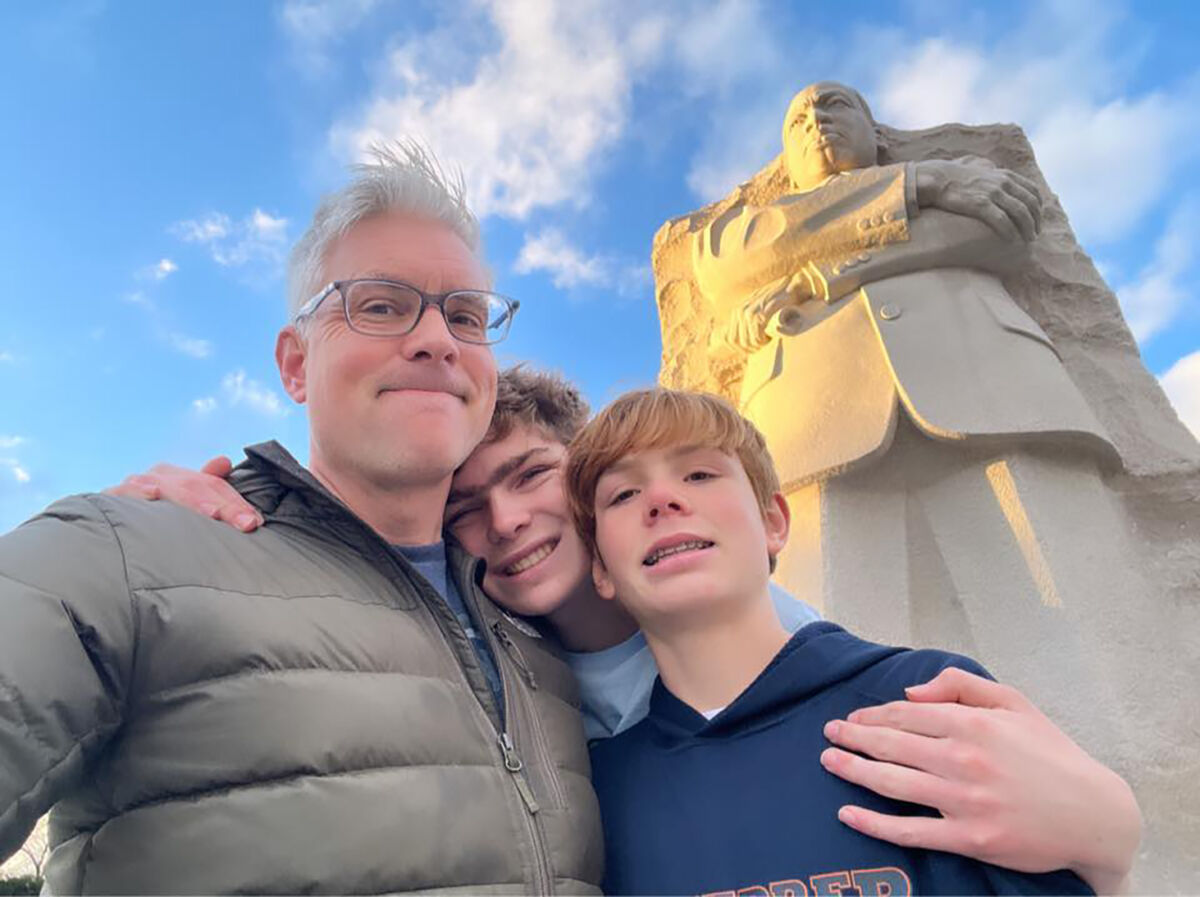
The author with his two sons in front of the Martin Luther King Memorial in Washington, D.C.
I remember the first steps my kids took. I remember my youngest standing on the mound at age 8 and pitching a baseball with the confidence of a Major-Leaguer. I remember my Mom and I weeping tears of joy when my oldest graduated grade school with the highest award, despite his severe neurological disorder.
I remember running the bases with my Dad at the Field of Dreams in Dyersville, Iowa. Playing music with my siblings at the 100th birthday of our great uncle. Performing in the Rock and Roll Hall of Fame, in Cleveland, Ohio, with dear friends. Proposing to my wife in a downpour at the end of an airport runway.
These moments are the true currency of life—far more valuable than any salary, equity package, or bonus. They are the dividends of a life full of love, challenges, and gratitude.
The bills will get paid. The next job will come. But the time with my loved ones is fleeting, and that’s the real work I need to focus on. Taking care of them is the best job I could ever have.
More Features about Work
Bob Pearson shows how staying curious turns experience into leverage, impact, and freedom.
Charlene Wheeless shows how choosing visibility becomes an act of impact, not performance.
Reinvention after 50 isn’t about bravery alone. It’s about money, experience, and knowing when the math works.
RestlessUrban was created to close the cultural gap between business and adults over 50.

